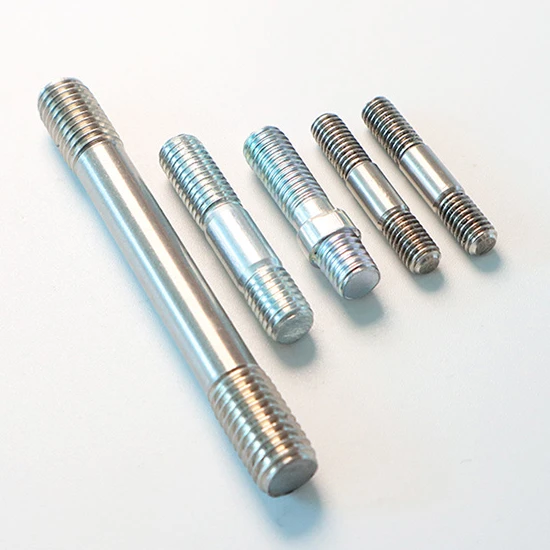When it comes to fastening critical components in various industries, stud bolts are a key player. In particular, stainless steel stud bolts and titanium stud bolts offer unique properties that make them ideal for high-performance applications, especially in the automotive industry. This article explores the features, benefits, and uses of 304 and 316 stainless steel stud bolts as well as titanium stud bolts, highlighting their applications and why they are essential for durability, strength, and reliability in automotive systems.
What Are Stud Bolts?
Stud bolts are long fasteners that typically have a threaded shaft on both ends and may be used with nuts or other components. Unlike regular bolts, stud bolts do not have a head. Their versatility allows them to be used in a variety of applications, including securing components in machinery, engines, and automotive systems. They are available in various materials, with stainless steel and titanium being popular choices due to their corrosion resistance, strength, and durability.
Why Choose Stainless Steel Stud Bolts?
Stainless steel stud bolts, such as 304 and 316 grades, are commonly used in applications that require superior resistance to corrosion and rust. Here’s why these materials are excellent choices for various industries, particularly in automotive and machinery applications:
1. 304 Stainless Steel Stud Bolts
- Material Composition: Made from an alloy of iron, chromium, and nickel, 304 stainless steel is one of the most commonly used grades of stainless steel.
- Corrosion Resistance: Known for its high resistance to oxidation, 304 stainless steel is ideal for environments that may involve exposure to moisture, chemicals, and high temperatures.
- Durability: These bolts are highly durable and capable of withstanding moderate to high-stress applications, making them suitable for automotive engine components, exhaust systems, and general fastening needs.

2. 316 Stainless Steel Stud Bolts
- Superior Corrosion Resistance: 316 stainless steel contains molybdenum, which enhances its resistance to corrosion, especially in marine environments or areas exposed to saltwater or harsh chemicals.
- High Strength: 316 stainless steel stud bolts are commonly used in high-performance applications where greater strength and resistance to wear and tear are necessary.
- Common Uses: These bolts are often found in automotive systems (particularly in parts exposed to extreme heat or corrosive environments), industrial machinery, and chemical processing equipment.
Why Choose Titanium Stud Bolts?
Titanium stud bolts are an excellent alternative to stainless steel, particularly in applications where weight reduction and extreme strength are required. Here’s why titanium is a standout material for high-performance automotive applications:
1. Lightweight and Strong
- Titanium is significantly lighter than stainless steel while maintaining a high strength-to-weight ratio, making it ideal for performance vehicles, racing cars, and aerospace applications where weight reduction is critical.
2. Exceptional Corrosion Resistance
- Titanium naturally forms a protective oxide layer that provides outstanding corrosion resistance, even in harsh environments. Whether exposed to saltwater, high humidity, or aggressive chemicals, titanium stud bolts can last longer than their steel counterparts.
3. High Heat Resistance
- Titanium’s ability to withstand high temperatures without losing strength makes it ideal for high-performance automotive engines, exhaust systems, and other components subjected to heat.
4. Applications in Automotive and Aerospace
- In the automotive industry, titanium stud bolts are commonly used in engine blocks, turbochargers, and suspension systems. They are also used extensively in aerospace applications where strength, lightweight construction, and resistance to extreme environments are essential.
Key Benefits of Stud Bolts in Automotive Applications
- Durability and Longevity: Both stainless steel and titanium stud bolts are designed to withstand high-stress environments, making them ideal for critical applications where strength and durability are paramount.
- Corrosion and Heat Resistance: Whether you’re dealing with high-temperature environments or exposure to moisture and chemicals, these stud bolts offer excellent corrosion resistance and heat tolerance.
- Versatility: Available in multiple sizes and materials, stud bolts can be used in a wide range of automotive applications, from engine components to exhaust systems and suspension parts.
- Cost-Effective: While titanium stud bolts tend to be more expensive than stainless steel, their lightweight and superior performance often justify the cost, especially in high-performance or specialized automotive systems.
Common Applications of Stainless Steel and Titanium Stud Bolts
- Automotive Engine Components: Both 304 and 316 stainless steel stud bolts are used in securing engine parts, radiators, and cooling systems, where both strength and corrosion resistance are necessary.
- Exhaust Systems: For parts exposed to high heat and aggressive chemicals, 316 stainless steel or titanium bolts provide excellent performance in exhaust manifolds, downpipes, and turbochargers.
- Suspension and Chassis: Titanium stud bolts are favored in high-performance racing cars due to their lightweight and strong properties, reducing overall vehicle weight without compromising strength.
- Body and Frame: Stainless steel stud bolts, especially 304 and 316 grades, are used to secure parts of the vehicle body, frame, and structural components.
- Marine and Offshore: 316 stainless steel stud bolts are also ideal for use in marine environments where resistance to corrosion from saltwater is critical.
Conclusion
When it comes to automotive applications, stud bolts made from stainless steel (304 and 316) and titanium offer unmatched benefits in terms of strength, corrosion resistance, and durability. These high-performance materials are ideal for critical fastening needs in automotive engines, exhaust systems, suspension systems, and more. Choosing the right stud bolt material can make a significant difference in the longevity and reliability of your automotive parts, ensuring smooth operation in even the most demanding environments.
Whether you’re looking for stainless steel stud bolts for medium-duty applications or titanium stud bolts for weight-sensitive, high-performance systems, understanding the unique properties of these materials will help you make an informed choice for your next project.